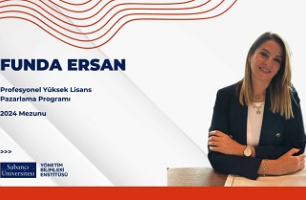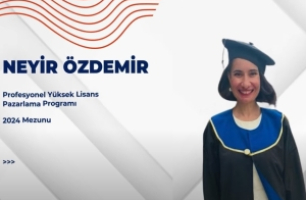Fall Semester
MIM 801 - Marketing Management - 3 Credit
Marketing Management Course objectives are 1) Familiarizing participants with marketing concepts and methods used in processes that integrate innovative and productive capabilities of a firm into its products and services in light of its customers' needs, market challenges, and company objectives; 2) Developing skills to apply these concepts and methods in market analysis, marketing strategy development and implementation design through developing a complete marketing plan in a real market environment.
Instructor: Zeynep Aydın Gökgöz
MIM 810 - Data Insights for Marketing - 3 Credit
This course examines data collection, data processing, and data analysis techniques to reach the accurate marketing insights. The course aims to equip students with the necessary knowledge and skills to determine market research questions and to choose appropriate research techniques for these questions. In addition, how to reach the right insight by using analytical methods will be discussed, different analytical methods will be exemplified and practiced.
Instructor: Vahid Karimi Motahhar
MIM 825 - Consumer Behavior - 3 Credit
In this course, the fundamentals of consumer behavior, which are decisive in the marketing and sales of consumer products and services, will be explained with theoretical models and practical examples. Focusing on the answers to the questions of who, what, when, how, where and why behind the consumers' product and service evaluation, selection, purchase and use decisions, the behavior patterns and reasons of the target audiences of the brands will be covered with examples. In this course, the effects of digital platforms and social networks, which are increasingly used by brands and consumers, on consumer behavior will be discussed.
Instructor: İpek Nibat Caryol
Spring Semester
MIM 804 - Digital Marketing Strategy - 3 Credit
This course focuses on how brands can reach consumer networks, build strong customer relationships and influence the digital pathway to purchase. Applying a digital marketing strategy in five steps, the course aims to provide practical examples on how products, ideas and behaviors spread and become popular. Digital advertising mix channels will be introduced and its principles will be covered. Finally, measurement and monitoring of digital marketing activities and agile marketing elements and their effects will be discussed.
Instructor: Ezgi Akpınar Uysal
MIM 806 - Omni-channel Management - 3 Credit
This course focuses on the design and management of marketing channels through which products and services are moved from their point of origin to their point of consumption. It also provides an in-depth look at today's increasingly complex channel management systems, where digital and traditional channels are integrated to offer a seamless experience for the consumer. In addition, the competition and cooperation dynamics between manufacturers, retailers, and other intermediaries are discussed.
Instructor: Barış Erman Depecik
MIM 808 - Advertising and Promotion - 3 Credit
This course aims to give a perspective about the fundamental aspects of integrated marketing communications management. Topics include offline and digital advertising, sales promotion techniques, public relations, point-of-purchase communication, interactive marketing and personal marketing. How the synergy between offline and digital communication channels should be handled in the marketing ecosystem will be discussed through cases.
Instructor: Ezgi Özgen
MIM 809 - Branding and Product Development - 3 Credit
Brands are among the most valuable intangible assets of companies, providing an enduring competitive advantage. However, the contemporary landscape of brand building and management has grown increasingly complex due to the empowerment of consumers through digitalization and social media. Today, consumers can offer highly visible, real-time feedback on social media, which can significantly impact a brand’s value. Simultaneously, competition has intensified as the global market has become more accessible. To navigate these challenges, branding and product management must be more customer-centric, agile, and responsive. This course provides a comprehensive understanding of the principles, strategies, and techniques essential for creating and sustaining strong products and brands in this fast-paced digital world.
Instructor: Zeynep Karagür
MIM 811 - Marketing Analytics - 3 Credit
This course is designed to provide students with applied knowledge on the use of analytical tools and methodologies for marketing decision-making. The course also aims to improve analytical skills and knowledge of the students. Finally, the course will discuss how to integrate big data processing, machine learning, artificial intelligence, and algorithms into marketing processes.
Instructor: Vahid Karimi Motahhar
MIM 857 - Pricing and Revenue Management - 3 Credit
Pricing is one of the most powerful levers a company can use to affect revenues and profits. It is also the least understood. Revenue management (RM) is the art and science of price-driven profit optimization. The objectives of this course are to teach how to identify opportunities for dynamic pricing and revenue management, and diagnose profitable applicability for a specific business or industry; tactical tools and frameworks for implementing RM principles; providing decision support in various industries; and examples of current RM practices in various industries.
Instructor: Cenk Koçaş
MIM 899 Graduation Project - 0 Credit
The program requires the conduct and completion of a project. The project topic and content is based on the interest and background of the student. It is to be approved by the faculty member serving as the project supervisor. At the completion of the project, the student is required to submit a final report. The report is to be approved by the project supervisor.

